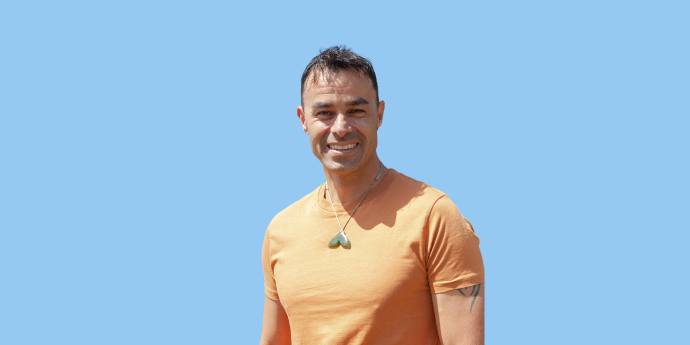
To boldly go where no man has gone before

It may not be a giant leap for mankind but it takes a leap of the imagination to send cremains into space.
Stu Potter MInstD is trying to change the narrative around death – by sending cremains (cremated ashes) into orbit.
The co-founder, managing director and director of StardustMe, the first Māori space-tech company in the world, will launch his venture of space memorial flights in January.
It is more final journey, than final frontier, as five tokens containing ashes will be sent on a SpaceX rocket from California, then orbit Earth on a satellite. The token can be tracked by GPS, providing a more interactive experience to commemorate life.
“We want to be able to celebrate a person’s life in an innovative and meaningful way,” Potter says. “We are helping families connect in a different way by placing ashes into space and allowing families to celebrate the lives of their loved ones for a life cycle of the satellite while it revolves around our planet.”
That can be up to five years or more, and at any time you can access third party apps to track your loved one’s movements through space.
“We are using smart technology and innovations so all family, no matter where they are in the world, are able to connect with their loved ones at any point in time. You can also time it so you can watch the satellite pass overhead in the night sky.”
Potter says this provides a much longer-lasting and connected experience than the traditional value chain of how people grieve generally at burials or cremations.
Typically, there can be a lot of memorial-based activity in the first few months, then people tend to disconnect from a plot and some may never go back, or an urn is stored out of view or the ashes are scattered in a sentimental place. The initial focus around grieving is easily lost, particularly for those based away from home, he says.
Being a champion of sustainability, Potter says his start-up reduces waste, despite being on a fuel-guzzling rocket.
“We utilise the empty room inside payloads going into space and we are utilising them for high-value services.”
And he is quick to counter any space junk suggestion.
“This was important right from the inception of StardustMe. We utilise the SpaceX Falcon 9 rockets as they are reusable. The token stays intact and every satellite re-enters the atmosphere and burns up. Basically, you are re-cremating ashes and they burn off on re-entry. There is zero waste in space.”
The StardustME tokens have been engineered to withstand the demands of space. They contain 1 gram of a person’s ashes, only a fraction of cremated remains. Potter says “it is a symbolic amount, no different to sprinkling a handful of ashes in a place of significance that the person is attached to. It also helps bring the costs down to make the service affordable”.
“It can be a hard grind in New Zealand to do anything innovative and be successful, let alone incorporating sustainability. We are a case in point – something that has not been done for an industry shrouded in taboo and being the first Māori space-tech company.”
The unique offering has been five years in the making and required a lot of validation before a permit to fly was granted by the Ministry for Business, Innovation and Employment.
Potter says part of the challenge was to design the hardware and tokens that meet space regulations. They partnered with Auckland University’s Space Institute to conduct testing and reach compliance.
“The space industry is in its infancy and still maturing in New Zealand in comparison to some other countries, but it was valued at over $1.75 billion in 2019. It’s an exciting time to be part of the industry and working with MBIE that currently oversees space regulation in New Zealand,” Potter says.
It may sound like ‘To Infinity and Beyond’, but Potter says “a whole heap” of friends and professionals have fallen in love with what they are doing and are supporting him and other co-founder Geoff Lamb.
But it hasn’t been easy because the venture is self-funded – “off the back of our own hard sweat, labour and tears while holding down a day job” – and without any government support. It has also been achieved during a pandemic.
“We all talk about innovation but how innovative are we?” Potter asks. “We started StardustMe on the basis of sustainability and innovation. It can be a hard grind in New Zealand to do anything innovative and be successful, let alone incorporating sustainability.
“We are a case in point – something that has not been done for an industry shrouded in taboo and being the first Māori space-tech company.”
As a former director of Sustainable Coastlines Trust, Potter says sustainability “absolutely, 100 per cent” has a place at the board table.
“A lot of people give it lip service or tag it on after the fact, particularly due to social or regulatory pressure. You need to incorporate it much earlier, at inception, and do it with intent and with purpose, and make it part of your core business. If you make it part of your core strategy and culture, then you can attract the people with the right attitudes and competency to drive it.”
Gisborne-based Potter, of Ngāti Awa descent, does a lot of work with Māori entities on the East Coast and in the region, in training and supporting strategy, governance and leadership.
Introducing diversity of thinking earlier allows you to build the strategy to lead the company in the right direction and develop the right networks to position it better for success, he says. Mātauranga Māori can be a compelling advantage if done right.
“Take StardustMe, for example. We could so easily have got waylaid just focusing on the technical aspect of the rockets and space travel. At the end of day, it has nothing to do with technology or the rocket. It has everything to do with human connection, grieving families and changing how we respond to loss.
“Because I am Māori, I operate philosophically with a te ao Māori outlook. It is always there and one of the driving strategies from a governance perspective and interwoven into everything we do as an organisation.
“It also provides opportunities and gives a competitive advantage,” he says. “Mainstream business is embracing human and environmental-centred design to remain relevant. These are flash words for putting people and the environment before profits which has been out of balance, and we are now living with those consequences globally. These philosophies are key aspects of te ao Māori-based around whanaungatanga and kaitiakitanga and at the heart of how we live.”
“At the time, I was the only Māori on the board and brought a te ao Māori outlook from a governance perspective. I was able to introduce a focus around the importance of connecting with Māori, to mix our beautiful culture and natural outlook with Western science.”
Potter’s first foray into governance was with Sustainable Coastlines, a charitable trust engaged in marine conservation and eliminating plastic from waterways.
From “radical and passionate eco evangelists organising beach clean-ups”, Sustainable Coastlines has morphed into a major organisation bringing data, science and intelligence to governance to help make the right decisions, he says.
Potter was invited to sit on the board, focusing on people capability and culture, especially as they started to grow and take on more staff.
Governance became even more important, Potter says, because as the company started to scale it needed to bring in a lot more rigour around the decisions that were being made, how they were being made and being able to stand in front of the pubic and say, ‘Yes, this is the impact of our work’.
“At the time, I was the only Māori on the board and brought a te ao Māori outlook from a governance perspective. I was able to introduce a focus around the importance of connecting with Māori, to mix our beautiful culture and natural outlook with Western science. A winning combination.
“Before then it didn’t really get the right level of discussion around the table. I guess I brought that level of conversation which was well received and supported from the other board members. I have since stepped back with my involvement at a governance level because I’m investing that into my start-up.”
Potter says it was a “beautiful thing” to watch the board embrace te ao Māori, rather than paying lip service or having those “awkward conversations”. To see it incorporated into governance, strategy and operations was “sublime”.
Potter is also the author of the Fish Story, a cautionary fable for children that incorporates te reo Māori and explores peace and environment conservation.


